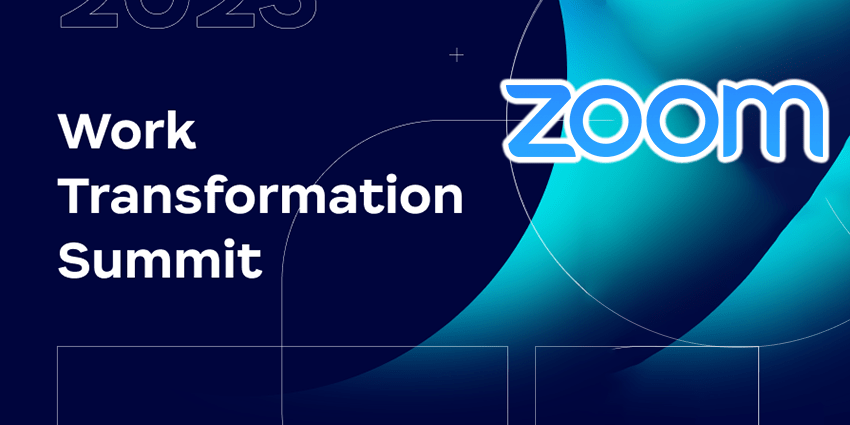Earlier in the year, Zoom convened its 2023 World Transformation Summit, bringing together business executives, artificial intelligence (AI) practitioners and thought leaders across industries.
The goal: share strategies for leveraging AI to enhance customer and employee experiences responsibly.
Spanning keynotes, fireside chats and panel discussions, the virtual event unpacked best practices for implementing AI amid mounting hype. Sessions also covered risks including algorithmic bias and misinformation along with mitigation tactics. Here are the summit’s most actionable insights for charting an ethical path to AI adoption.
Curb AI Enthusiasm with Human Oversight
In her opening keynote, Zoom Chief Product Officer Smita Hashim acknowledged feeling awestruck by AI’s rapid evolution. The ability to have natural conversations with chatbots like Claude and GPT-3 feels magical. However, Hashim cautioned the AI hype warrants perspective.
Generative language models remain computational tools devoid of human judgement and context. Despite their eloquence, they frequently generate convincing but inaccurate or nonsensical information.
To benefit from AI’s capabilities while controlling for quality, Hashim advocated a “human-centred design” approach. For instance, enable users to review and edit AI-generated meeting summaries before disseminating them. Let humans guide the technology.
Hashim also discussed Zoom’s “federated approach” to AI, leveraging a mix of proprietary models, third-party services like Anthropic and customer-specific customisation based on unique vocabulary and use cases. This allows Zoom to advance with the AI field instead of locking into any single provider.
Infuse AI into Work Thoughtfully
Keynote speaker Pascal Bornet expanded on judiciously embedding AI into business operations. As an AI practitioner, Bornet focuses on “making the world more human using technology.”
To Bornet, AI’s value is freeing employees from repetitive, low-value work so they can undertake higher-level analysis and decision-making. However, he stressed that, unlike human colleagues, AI lacks contextual understanding. Treat it as a collaborative digital asset, not an independent worker.
Bornet urged organisations to identify opportunities where AI can absorb tedious, rules-based tasks while augmenting complex cognitive processes. Form cross-functional teams to pinpoint use cases, calculate potential efficiency gains and continually evaluate AI’s impact on overall productivity and output quality.
Deliver Personalised, Emotionally Intelligent CX
According to Metrigy CEO Robin Gareiss, natural language processing and sentiment analysis make conversational AI invaluable for boosting customer satisfaction. Beyond fielding common support questions, AI chatbots can explain bill charges, recommend products, alert customers to status changes, and channel complex issues to human agents.
Gareiss noted AI’s ability to interpret customer emotions from text and voice. This helps brands refine customer journeys by routing heated inquiries to empathetic agents and defusing frustration through virtual assistants’ compassionate responses.
AI also enables greater personalisation by creating customer micro-segments informed by data like past purchases, demographics and channel preferences. Gareiss cited the example of a home goods retailer using AI to align web recommendations with customers’ store browsing history.
Better Agent Tools Improve Employee Experience
While AI empowers self-service options, speaker Jason Averbook of Mercer stressed it also makes human agents more effective. Contact centre AI can surface relevant knowledge, propose responses, guide cross-selling and analyse calls to improve scripts and training.
By quickly providing agents with recommendations during customer interactions, AI allows them to demonstrate greater expertise and empathy. Agents feel more fulfilled and customers enjoy more positive brand experiences.
However, Averbook noted contact centres should frame AI tools around enhancing human strengths versus replacing agents. Change management and continuous training are essential to help employees adopt emerging capabilities. AI works best when presented as an augmenting asset rather than a threat.
Develop Responsible AI Guidelines
Presenter Nancy Rademaker, author of “Artificial Intelligence for Talent Leaders,” spotlighted key ethical considerations as organisations pursue AI initiatives.
Those are, mitigate bias by staffing diverse AI teams and auditing algorithms regularly, protecting privacy by de-identifying data and enabling opt-outs, uphold transparency by explaining when and how AI gets used, maintain accountability by assigning oversight roles, and lastly aligning AI with company values and avoid harmful use cases.
Rademaker noted the European Union recently published its Artificial Intelligence Act, though compliance guidance remains under development. She emphasised the importance of companies proactively addressing risks themselves to build trust and preempt stricter policy interventions.
Unify Disparate Data for More Accurate AI
Averbook stressed that before deploying AI, companies must get their data house in order. He warned that “garbage in, garbage out” truisms apply more than ever with AI. Even advanced algorithms falter on fragmented, outdated or dirty data.
To fuel accurate AI, businesses must integrate siloed data and decide on metadata standards. They also need frameworks for continuously monitoring data quality and bridging gaps. Data governance is a prerequisite for impactful AI.
Averbook also cautioned companies against letting departments or business units implement AI randomly without coordination. This will breed confusion and inefficiency. AI success requires unifying data and executive vision.
Reaching Potential
The insights shared at Zoom’s 2023 World Transformation Summit make one thing clear: realising AI’s immense potential requires judicious governance and pragmatic adoption.
Maintaining realistic expectations, prioritising high-impact use cases, centralising quality data and embracing responsible AI principles are imperative. With careful oversight and change management, AI can drive tremendous efficiency gains, facilitate more meaningful customer and employee interactions, and unlock new sources of value.
However, organisations must approach these powerful technologies thoughtfully. By implementing AI in focused, ethical ways that augment human capabilities, businesses can fully capitalise on AI’s benefits while building trust and mitigating risks. If this balanced mindset takes hold, AI may truly transform work for the better.










